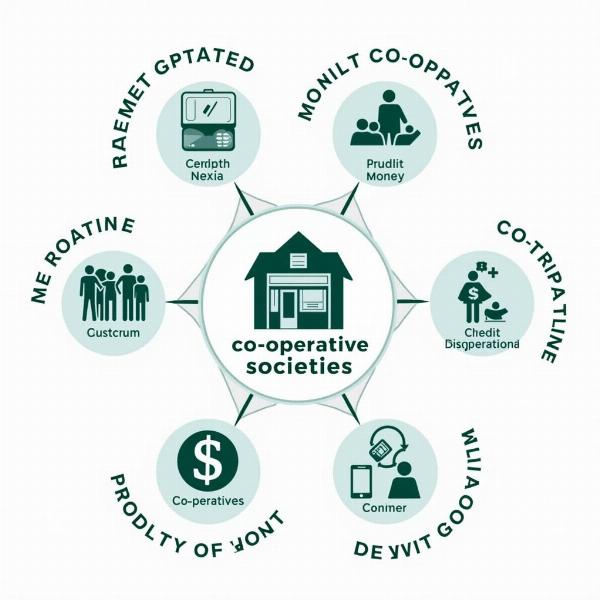Co-operative society meaning in Hindi is सहकारी समिति (sahakari samiti). Understanding the meaning, principles, and benefits of co-operative societies is crucial for anyone interested in community development and economic empowerment in India. This article will delve deep into the concept of co-operative societies, exploring their various types, functions, and significance within the Indian context. We’ll also examine the legal framework governing these organizations and address common questions surrounding their operation.
What is a Co-operative Society? (सहकारी समिति क्या है?)
A co-operative society is a voluntary association of individuals united by a common economic, social, or cultural need. They pool their resources and efforts democratically to achieve shared goals, operating on the principles of self-help and mutual aid. These societies are owned and controlled by their members, who have equal voting rights regardless of their capital contribution. They aim to promote the economic and social well-being of their members, rather than maximizing profit like traditional businesses.
Types of Co-operative Societies in India
India has a diverse range of co-operative societies catering to various needs. Some of the prominent types include:
- Consumer Co-operatives: These societies procure and distribute goods and services to their members at reasonable prices, eliminating the role of middlemen.
- Producer Co-operatives: Farmers, artisans, and other producers form these societies to collectively market their products, ensuring better prices and reducing exploitation.
- Credit Co-operatives: These societies provide financial assistance to their members at affordable interest rates, promoting financial inclusion.
- Housing Co-operatives: These societies facilitate the construction and ownership of affordable housing for their members.
- Marketing Co-operatives: These societies help farmers and producers market their produce effectively, ensuring better returns.
- Farming Co-operatives: These focus on collective farming practices, resource sharing, and increasing agricultural productivity. This can be particularly helpful for marginal farmers meaning in hindi, who often benefit from shared resources.
 Different Types of Co-operative Societies
Different Types of Co-operative Societies
Legal Framework Governing Co-operative Societies
Co-operative societies in India are governed by the Co-operative Societies Act, which varies from state to state. This act outlines the rules and regulations for the formation, registration, management, and dissolution of co-operative societies.
Benefits of Joining a Co-operative Society
Joining a co-operative society offers numerous advantages, including:
- Democratic Control: Each member has an equal say in the society’s affairs.
- Economic Benefits: Members receive goods and services at competitive prices and share in the profits.
- Social Development: Co-operative societies promote social cohesion and mutual support within the community.
- Financial Inclusion: Access to affordable credit and financial services.
- Empowerment: Co-operatives empower individuals, especially those from marginalized communities.
- Reduced Exploitation: By working together, members can avoid exploitation by middlemen and other intermediaries. This is similar to the idea behind pantisocracy meaning in hindi, which emphasizes equal distribution.
Conclusion
Co-operative societies (सहकारी समिति – sahakari samiti) play a vital role in India’s socio-economic landscape, fostering inclusive growth and empowering communities. By understanding their meaning and function, individuals can leverage these platforms to improve their livelihoods and contribute to a more equitable society.
FAQ
- What is the minimum number of members required to form a co-operative society? Generally, a minimum of ten members is required.
- How is a co-operative society registered? Registration is done with the Registrar of Co-operative Societies in the respective state.
- Can a co-operative society be dissolved? Yes, under specific circumstances and procedures outlined in the Co-operative Societies Act.
- Are co-operative societies profitable? While profit is not the primary objective, well-managed societies can generate surplus, which is distributed among members.
- What is the role of the government in co-operative societies? The government provides a regulatory framework and support through various schemes and initiatives.
- How can I find a co-operative society near me? Contact the local Registrar of Co-operative Societies or search online for relevant information.
- What is the difference between a co-operative society and a company? Co-operatives prioritize member welfare and democratic control, unlike companies focused on profit maximization.
Meaning-Hindi.in is your one-stop solution for all your Hindi translation needs. We offer a wide range of translation services, from business and legal documents to technical manuals and website localization. Our team of expert translators ensures accurate and culturally sensitive translations, catering to diverse clients, including farming in hindi meaning or businesses looking for wolf pack meaning in hindi. oculoplasty meaning in hindi is another example of our specialized translations. For high-quality, professional Hindi translation services, contact us at [email protected] or call us at +91 11-4502-7584. Meaning-Hindi.in is committed to bridging the language gap and facilitating seamless communication.